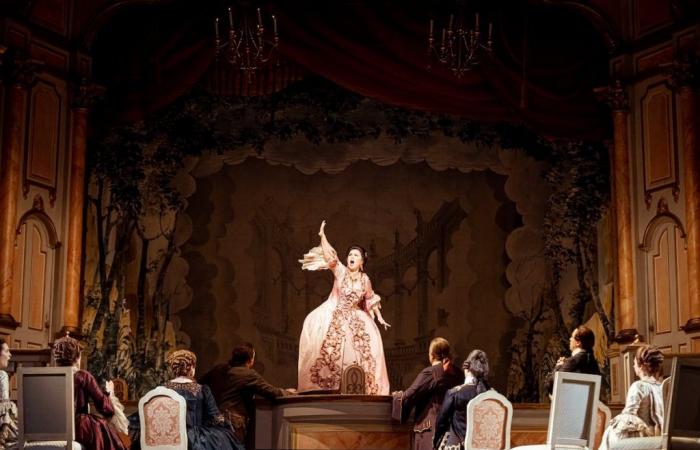
After the poisoned death of the protagonist, the composer Francesco Cilea does not finish his opera Adriana Lecouvreur with the familiar forest of dramatic and thunderous dissonances. On the contrary, he opts for an almost unreal sweetness and the luminous tremolo of the strings with the arpeggios of the harp in pianissimo. This exquisite musical detail has inspired one of the most beautiful licenses of David McVicar’s production that returned, last Sunday, June 16, to the stage of the Liceu in Barcelona. The former colleagues of the great actress from the Comédie-Française return to the stage to say goodbye to her.
The Scottish stage director’s proposal is an exquisite tribute to the French eighteenth-century scene. The set, designed by Charles Edwards, replicates a wooden theater circa 1730 that turns or adjusts in each act to place us behind the scenes (with the bust of Molière indicating the libretto), in one of its corners, in front of the proscenium or in her bare rear. Each setting is supported by lighting by Adam Silverman using candles along with attractive period costumes designed by Brigitte Reiffenstuel. And it also highlights a historicist ballet for the third act choreographed by Andrew George.
It is a production with slight metatheatrical nods that premiered in 2010 at the Royal Opera House in London. It arrived at the Liceu in 2012 as part of a co-production with the Vienna, Paris and San Francisco Operas. In replacement of Justin Way he has traveled to La Scala in Milan or the Metropolitan in New York. And its reiteration has contributed to a curious current rebirth of Cilea’s main opera, which can also be seen at the start of the next season at the Teatro Real in Madrid.
But Adriana Lecouvreur It is the combination of a refined score by Cilea and a poor libretto by Arturo Colautti. An uneven adaptation of Eugène Scribe and Ernest Legouvé’s comedy-drama, released in 1849, about the fictionalized death of the 18th-century French actress, it focuses exclusively on her sentimentality. Adriana sings of her passionate love for Mauricio, in the first act, she saves the princess of Bouillon who is her rival, in the second, she confronts her by reciting Phaedra from Racine, in the third, and dies breathing the poison into a bouquet of violets, in the fourth.
The plot uneasily combines the world of the theater, of the stage director Michonnet and his four actors, and the intrigues of high society, which include the Prince of Bouillon and the Abbe di Chazeuil. And the opera, premiered in 1902, shows the heritage of the Italian operatic tradition, but with nods to French melodrama and a certain Wagnerian orchestral aroma. A title, therefore, focused on voices, but capable of combining a continuous orchestral flow dotted with motifs for characters, objects and feelings with perfectly isolatable vocal numbers.
The vocal cast has been a real handicap for this return of Adriana Lecouvreur to the Liceu. In recent months, the Barcelona theater has seen three of the four leads in the first cast (soprano Sonya Yoncheva, tenor Jonas Kaufmann and mezzo-soprano Anita Rachvelishvili) canceled for various reasons. In the end, it was necessary to have another soprano, the Polish Aleksandra Kurzak, who has made her debut in the lead role and will sing the first four performances in five days. And both the British tenor Freddie De Tommaso and the mezzo-soprano Italian Daniela Barcellona.
Kurzak was the big winner on opening night, although her Adriana was far from the best vocal incarnations of Cilea’s character. The Polish singer exhibited notable virtuosity in handling the numerous dynamic inflections written in the score, but her exceptional technique did not connect with the expressiveness of the character. And we end up not getting a glimpse of the woman behind the actress. We see this especially in her uneven version of Poveri fiori, in the fourth act. She sang best in the famous Io son l’umile ancellafrom the first, although his declamation in Italian of Racine, from the third act, did not achieve the expected suspense.
De Tommaso was also highly applauded throughout the performance. But his Maurizio was musically uneven. He demonstrated it by imposing his powerful stream of voice on the precise dynamic indications written by Cilea, as in the beginning, in mezzanine voice and pianísimo, from his famous aria from the first act The dolcissima efligie. She improved in the second act with L’anima ho stanca and had her best moment, in the third, in the martial Il russo Mencikoff, where he freely showed his vocal power in long phrases. He also shone in his duets with Kurzak and Barcellona.
The mezzo The Italian woman also failed to elevate the haughty imprecations of the princess of Bouillon, in her aria in the second act. Acerba volutta. Although Barcellona’s volume and vocality fit better in the bel canto repertoire, she starred alongside Kurzak in one of the best moments of the night in the tense final scene of the second act. The baritone Ambrogio Maestri assured like Michonnet, exhibiting his stature as a Verdian singer, in Ecco il monologue, while the scenery allowed us to see Kurzak representing Roxane, in Bayseye from Racine.
Among the supporting cast, the tenor Didier Pieri stood out, as Abate di Chazeuil, at the beginning of the third act. Felipe Bou was a convincing Prince of Bouillon and the same can be said of the quartet of actors formed by Irene Palazón, Anaïs Masllorens, Marc Sala and Carlos Daza. The six of them freshly resolved the difficult buffo sextet of the first act. The Choir of the Gran Teatre del Liceu did well in its punctual interventions, while the Symphony Orchestra sounded orderly and with exquisite solos in the woodwind and the strings, highlighting the elegant interventions of the concertmaster Kai Gluusteen.
He convinced the musical direction of the head of the Houston Grand Opera, Patrick Summers, with his solvency. The American master shone more in the tense scenes of the second act than in the antics of the first, where he lacked effervescence. His best act was the third, with a brilliant handling of textures and tempos in the ballet. But he did not manage to raise the beautiful sad walker that opens the fourth act, although the sublimation of the protagonist sounded exquisite with that ending full of unreal sweetness and luminosity, seasoned by the reverence of the Comédie-Française actors to the dead actress. By the way, this function Adriana Lecouvreur was dedicated to the memory of another young artist who died prematurely: the Belgian soprano Jodie Devos.
‘Adriana Lecouvreur’
Music by Francesco Cilea. Libretto by Arturo Colautti. Aleksandra Kurzak, soprano (Adriana Lecouvreur) Freddie De Tommaso, tenor (Maurizio), Ambrogio Maestri, baritone (Michonnet), Daniela Barcellona, mezzo-soprano (The Princess of Bouillon), Felipe Bou, baritone (Prince of Bouillon), Didier Pieri, tenor (Abate di Chazeuil), Carlos Daza, baritone (Quinault), Marc Sala, tenor (Poisson), Irene Palazón, soprano (Mademoiselle Jouvenot), Anaïs Masllorens, mezzo-soprano (Mademoiselle Dangeville) and Carles Cremades, tenor (A Butler). Choir and Symphony Orchestra of the Gran Teatre del Liceu. Musical direction: Patrick Summers. Stage direction: David McVicar. Replacement: Justin Way. Gran Teatre del Liceu, June 16. Until June 29.
All the culture that goes with you awaits you here.
Subscribe
Babelia
The literary news analyzed by the best critics in our weekly newsletter
RECEIVE IT





